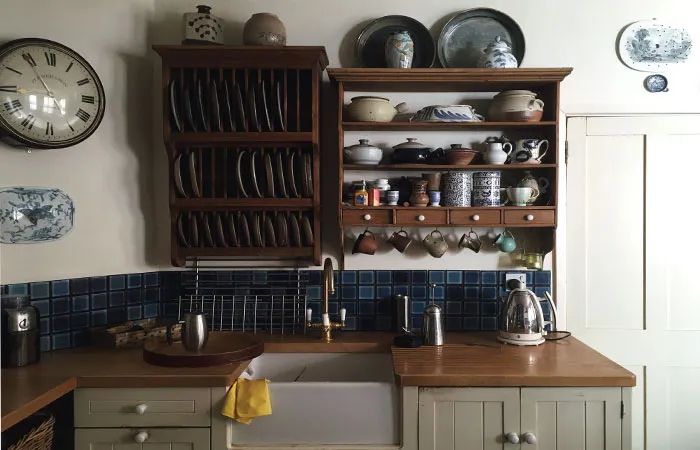Kitchen sinks play an integral role, so they definitely need to take centre stage. From materials, through to styles and sizes, the choices are endless when it comes down to selecting yours.
For your bathroom’s sink, baking soda is your best friend: sprinkle some on a sponge and scrub your sink to get rid of those sticky food stains. Once you’re done, use white vinegar to apply the antiseptic and disinfectant solution, as it will clean the sink without scratching it.
Granite composite
Granite composite sinks offer the beauty and durability of real stone at an affordable price. Their construction combines the strength and beauty of natural granite with the acrylic resin used in fibreglass. Granite composite sinks are designed to stand up to the most gruelling kitchen chores, while remaining in perfect working order and looking beautiful.
They are highly resistant to heat, scratching and staining, and indifferent to bleach, chlorine and many other chemicals, meaning these kitchen surfaces are excellent highlights for modern kitchen styles.
Sinks are easy to maintain clean, and can last for several years with regular maintenance, if you rinse them often after each use to flush off sitting liquids, and food. Clean them every now and then with mild detergent or non-abrasive scrub pads when needed to give them a deeper clean if you feel the need to. However, make sure to follow the manufacturer’s guidelines on cleaning practices, as never use abrasive or chemical cleaners on them.
Solid surface
A solid surface kitchen sink is an ideal addition to a modern kitchen design offering different styles and colours of different materials that suit the persona of the kitchen style and is also highly durable. Furthermore solid surface sinks are antiseptic in nature for easy cleaning and at the same time are antibacterial which is suitable for hygienic purposes as well.
It is quite important when deciding which would be the suitable sink for your kitchen as a solid surface that one carefully keeps in mind the aesthetic appeal of the material as well as ones individual needs and taste.
Where solid surface goes the extra mile is in being permanently seamed into countertops to eliminate visible sink lips and without rims to catch dirt, mildew or mould, and being nonporous so they never absorb stains or germs that penetrate them. And they will never form chips, dents or impacts where they connect to your countertop like other materials would.
There are plenty of options to the common material for sinks – solid surface – include stainless steel sinks, ceramic sinks and porcelain sinks. Stainless steel sinks are often the metal of choice as they are gorgeous to look at and can remain in great shape for a very long time; with ceramic and porcelain sinks, they are greatly known for their timeless charm; copper and cast iron models also have an edge because over time, they acquire a more elegant natural patina.
Stainless steel
Stainless steel, durable and fashionable items of decor. Their clean pallido granite and stone and their subtle glow complement almost every style; moreover, they’re resistant against rust, heat and high impacts; against abrasive detergents and high temperature water. However, a scratch or a dent might require whilst rubbing with metal polish repair.
The majority of kitchen sinks produced from grade 304 stainless have steel with a 17 per cent chromium, 10 per cent nickel, 2 per cent molybdenum content, while grade 316 has a better corrosion resistance due to a higher molybdenum content.
When it comes to durability, if you want to buy a stainless kitchen sink, you need to know how gauge affects the steels. A higher gauge indicates thickness – it can be produced by stamping or folding instead of the modern mass production method of moulding which gives these sinks different looks, with thicker models curved and open to the back. When it comes to durability, for gauge levels 18 and below it would be best.
Acrylic
Homeowners have a new found attraction for Acrylic Sinks mainly because of its indestructibility and design flexibility. Lightweight, easily installed, non-porous and impermeable (hence can be cleaned with just mild soap solutions), and resistant both to stains and scratches, acrylic sinks can weather the daily pounding due to its lightness yet resilience. A drawback however is the fact that it is not heatproof, and cannot be exposed to extreme temperatures. So if possible hot pots and pans directly into your sink, and don’t use harsh cleaners on it.
For the homeowner, acrylic kitchen sinks are a great choice, since they come in a variety of styles and colours to match any kitchen design and remain relatively inexpensive when compared with porcelain or stainless steel models.
Sink undercoated in gloss acrylic is acrylic, which can also deteriorate upon exposure to heat and if you use it to place hot pots and pans. It also cannot withstand chemical drain-openers or petroleum products, which can harm its surface in the long-term.
Choosing a Kitchen Sink




